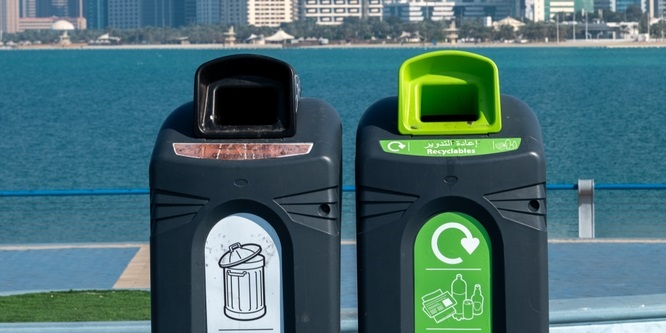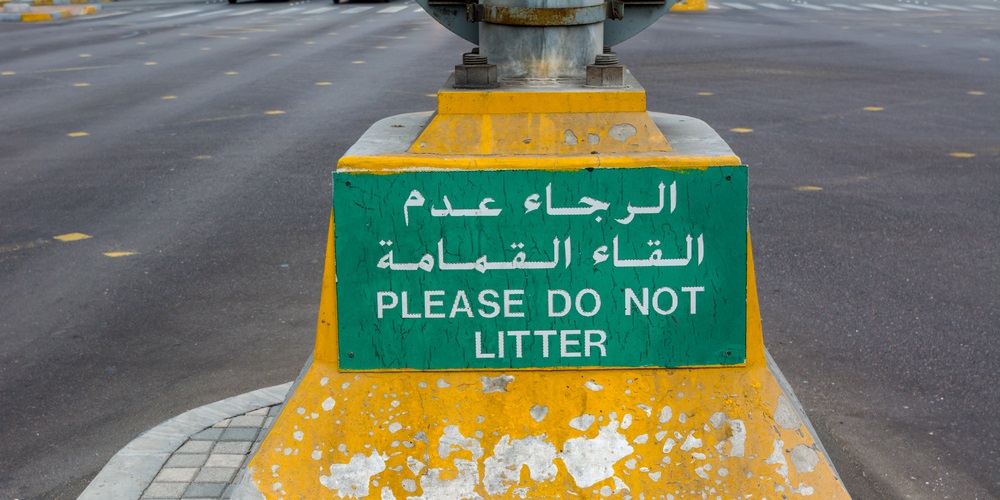Abu Dhabi has introduced stricter rules to combat public littering, with new fines reaching up to AED 4,000. This move is part of a broader effort to protect the environment and keep public spaces clean. The initiative is being led by the Abu Dhabi Waste Management Company (Tadweer), in collaboration with local authorities, as part of a larger campaign to raise awareness and promote responsible public behavior.
New Rules for a Cleaner City
The campaign, titled “Our City. Our Responsibility”, aims to encourage residents and visitors to keep their surroundings clean by properly disposing of waste. Officials say the new rules are not just about punishment, but also about building a culture of civic responsibility.
The new penalties apply to various acts of public littering, including throwing waste from vehicles, dumping garbage in open spaces, and failing to clean up after pets. The aim is to send a clear message: those who disrespect the environment will face serious consequences.

What Offenses Can Lead to a Fine?
The updated regulations cover a wide range of violations, including:

- Throwing food wrappers, cigarette butts, or tissues on streets, beaches, or parks
- Dumping waste in non-designated areas
- Leaving garbage bags outside collection bins
- Disposing of large items like furniture or construction waste in public areas without permission
- Not cleaning up after animals, especially in public parks or walkways
Each of these acts can now result in a fine ranging from AED 1,000 to AED 4,000, depending on the severity and type of violation.

For example, someone caught throwing waste out of a moving car may face a penalty of AED 1,000 or more. If the littering involves hazardous or bulky materials, the fine could go up to AED 4,000.
Why the Stricter Penalties?
Abu Dhabi officials say that the new fines are meant to tackle growing concerns over public cleanliness and environmental health. Littering not only spoils the appearance of the city but also harms the environment and poses risks to public safety.
Tadweer explained that cleaning up litter costs the government millions of dirhams every year. By enforcing these rules, the goal is to reduce the strain on public services and encourage people to take responsibility for their waste.
A spokesperson from Tadweer said, “We want to create a clean, healthy environment for everyone. These fines are meant to deter negative behavior and remind people that we all have a role to play in protecting our city.”
Public Response and Awareness Campaigns
The campaign is also supported by awareness drives across Abu Dhabi. Signs have been put up in parks, beaches, and residential areas reminding people about proper waste disposal. Mobile teams are visiting schools and community centers to educate the public, especially young people, about the impact of littering.
Social media channels have also been flooded with videos and posts showing the consequences of littering and explaining how citizens can report violations. There are also hotlines and mobile apps where people can file complaints or upload photos of violations anonymously.
Local residents have had mixed reactions to the new rules. Some welcomed the changes, saying they were long overdue.
“I think it’s a great idea,” said Aisha Al Mansoori, a resident of Khalifa City. “You see people littering all the time. If they know there’s a big fine, they’ll think twice.”
Others, however, expressed concern about the sudden jump in fines and questioned how fairly the rules would be enforced.
Who Can Issue the Fine?

Tadweer inspectors, along with local municipal officers, have been authorized to issue on-the-spot fines to violators. These officials are trained to assess the situation and document the offense with evidence, such as photos or witness statements. Repeat offenders could also face additional penalties or legal action.
The inspections are being carried out daily, especially in areas known for high foot traffic like Corniche, beaches, tourist spots, and residential zones.
How Can You Avoid Getting Fined?
To avoid getting fined under the new rules, residents and visitors are advised to:
- Always use public bins and recycling containers
- Never throw waste from cars or leave trash on the ground
- Use proper services to dispose of large items or construction waste
- Clean up after their pets in public places
- Report illegal dumping or littering to authorities when they see it
Tadweer has also introduced services to help residents dispose of large or unwanted items for free or at a low cost. These services can be booked through their website or customer service center.
Looking Ahead: A Cleaner, Greener Abu Dhabi
The campaign reflects a growing global trend where cities are getting tougher on littering and pollution. With tourism on the rise and more people moving to Abu Dhabi, the government wants to ensure that the city remains clean, sustainable, and livable.
Authorities have made it clear that this is not just a temporary measure. The enforcement of these rules is expected to continue long-term, with regular updates and public engagement to keep the momentum going.
Environmental experts have praised the move, calling it a necessary step to change public habits and reduce environmental damage.
“Education and enforcement need to go hand-in-hand,” said Dr. Nader Ibrahim, an environmental policy analyst. “It’s about more than just fines—it’s about building a cleaner future.”
Also read: 10 Must-Visit Places in Abu Dhabi: A Traveler’s Guide














